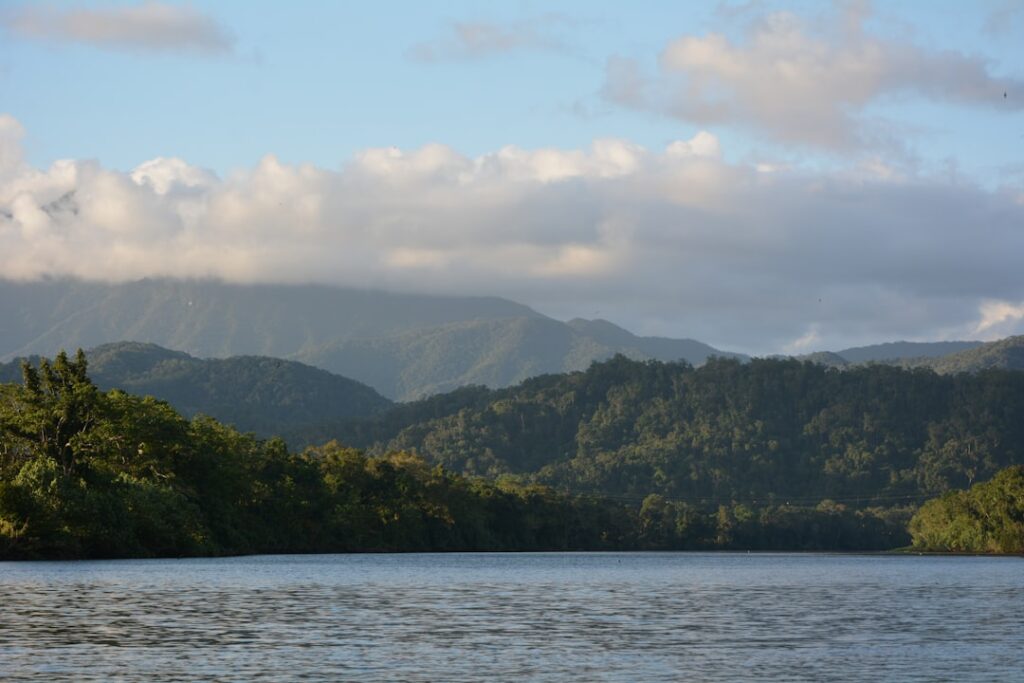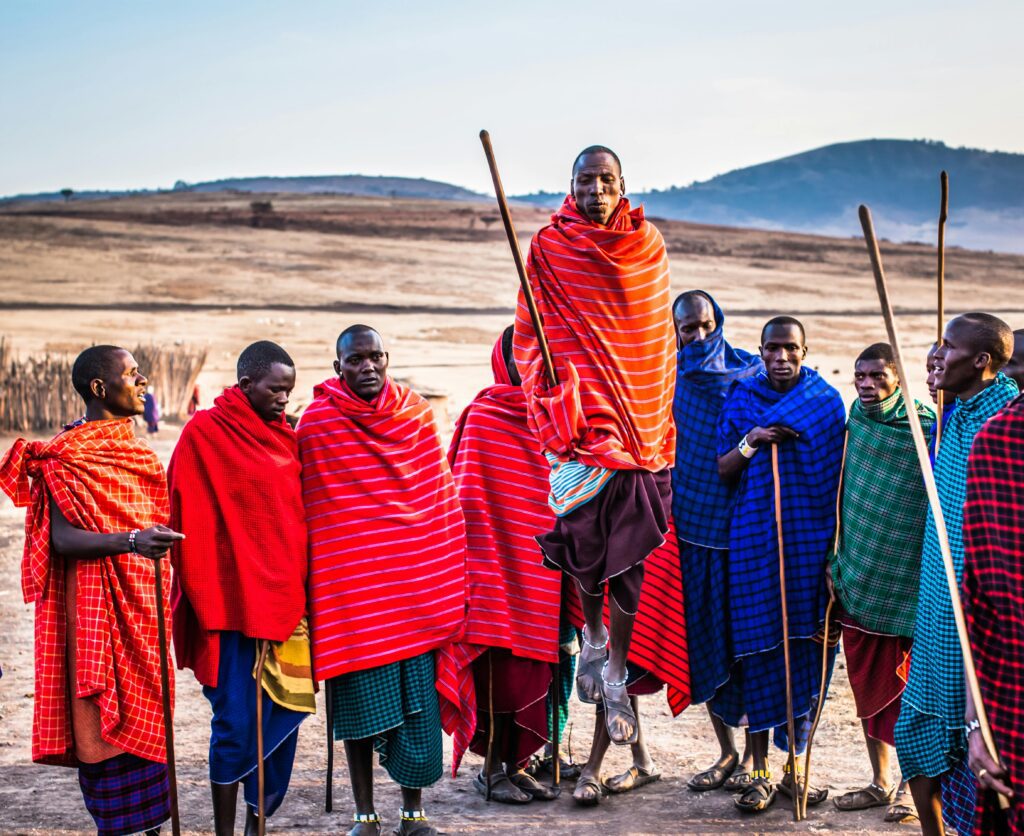The Ultimate Tufi, Papua New Guinea Guide: Fjords, Culture & Diving Paradise
Tufi, Papua New Guinea isn’t just a destination—it’s a living tapestry of ancient traditions meeting pristine nature. The scent of saltwater mingles with woodsmoke from village fires as outrigger canoes glide through glassy fjords beneath volcanic cliffs. This remote paradise offers an authentic cultural immersion amidst breathtaking natural wonders.
Why Tufi, Papua New Guinea Stands Out
Pond surrounded with tall and green trees under white skies, Tufi, Papua New Guinea
- Historic Architecture: Traditional Oro stilt houses dating back centuries, built directly over fjord waters using ancient techniques passed through generations.
- Cultural Scene: The annual Tufi Cultural Show in August featuring spectacular sing-sing performances with elaborate headdresses and traditional dances.
- Local Specialties: Mumu – a traditional feast where pork, sweet potatoes and greens are cooked in an underground oven with heated stones.
Pro Tip: Visit during the dry season (May to October) for optimal diving conditions and to catch the August cultural festival. Book dive trips and accommodations at least 3 months in advance as Tufi Dive Resort has only 12 rooms.
Map of Tufi, Papua New Guinea
Use these interactive maps to explore Tufi, Papua New Guinea and plan your route:
📍 View Tufi, Papua New Guinea on OpenStreetMap
🗺️ Open Tufi, Papua New Guinea in Google Maps
Planning Your Trip: Practical Essentials
Getting There and Around
- By Air: Tufi Airport (TFI) receives daily flights from Port Moresby on PNG Air and Air Niugini. Flight time: 1 hour. Tufi Dive Resort provides airport transfers for guests (15 minutes, included). Book flights at Skyscanner for best deals.
- By Train: No rail service available in Papua New Guinea. Reserve tickets at Trainline or the national railway website.
- By Car: Road access is extremely limited. Most visitors arrive by air. Compare car rentals at RentalCars.com.
- Local Transport: Water taxis are primary transport between villages (K20-50 per trip). Resort boats provide transport for activities. Walking is limited to village areas.
Best Time to Visit
Tufi enjoys a tropical climate with distinct wet and dry seasons. The dry season offers optimal conditions for diving and cultural activities.
| Season | Weather | Highlights |
|---|---|---|
| Dry Season (May–Oct) | 25-30°C, low rainfall, calm seas | Best diving visibility (30m+), cultural festivals, whale shark sightings, moderate crowds |
| Wet Season (Nov–Apr) | 28-32°C, heavy rainfall, rough seas | Lush vegetation, fewer tourists, lower rates, limited diving operations |
| Shoulder (Apr/Nov) | 27-30°C, intermittent showers | Good value, transitioning conditions, cultural activities still available |
Budgeting for Tufi, Papua New Guinea
An aerial view of a tropical forest with a body of water in the background, Tufi, Papua New Guinea
| Category | Budget | Mid-range | Luxury |
|---|---|---|---|
| Accommodation | K150-250 (village homestay) | K600-800 (Tufi Dive Resort) | K900-1200 (premium bungalows) |
| Meals | K30-50 (local markets) | K80-120 (resort dining) | K150-200 (private dining) |
| Transport | K20-50 (water taxis) | K100-200 (boat tours) | K300-500 (private boats) |
| Activities | Free (village walks) | K200-400 (diving) | K500-800 (private guides) |
| Daily Total | K200-350 (≈$60-100) | K980-1520 (≈$280-430) | K1850-2700 (≈$530-770) |
Top Attractions and Must-See Sights
| Attraction | Description | Hours | Entry Fee |
|---|---|---|---|
| Tufi Fjords | Spectacular volcanic fjords offering world-class diving and breathtaking scenery | Daylight hours | Free (tour costs vary) |
| Local Village Tours | Authentic cultural experiences in traditional Oro communities | 9 AM-4 PM | K50-100 per person |
| Shark Reef | World-renowned dive site with guaranteed shark encounters | Dive schedules | K350 two-tank dive |
| MacLaren Harbour | Historic WWII site with wreck dives and stunning natural beauty | Daylight hours | K400 including guide |
3-Day Itinerary: Tufi, Papua New Guinea’s Highlights & Hidden Gems
Day 1: Fjord Exploration & Cultural Immersion
- Morning: 7:30 AM fjord tour departure from Tufi wharf (K200). Witness traditional fishing methods and visit stilt villages built over water.
- Afternoon: 12:30 PM village lunch at Kofure Village (K60) featuring fresh fish and local vegetables. Participate in traditional cooking demonstration.
- Evening: 6:00 PM cultural performance at Tufi Dive Resort (K80) followed by dinner featuring mumu-style cooking.
Day 2: World-Class Diving Adventure
- Morning: 8:00 AM two-tank dive at Magic Mountain and Susan’s Reef (K350) – renowned for soft corals and reef sharks.
- Afternoon: 1:30 PM surface interval lunch on board featuring fresh tropical fruit and sandwiches. Visit to local artisan market.
- Evening: 6:30 PM sunset drinks at resort bar followed by seafood barbecue dinner (K120).
Day 3: Historical Sites & Local Crafts
- Morning: 8:00 AM boat transfer to MacLaren Harbour (K150) for WWII wreck exploration and visit to historical sites.
- Afternoon: 12:30 PM tapa cloth making demonstration in Uiaku Village (K40) and traditional lunch.
- Evening: 6:00 PM farewell dinner at resort with local musicians performing traditional songs.
Cultural Insights & Etiquette
- Language: English is official language but Oro language predominates. Learn “Moning” (good morning) and “Tenkyu” (thank you).
- Customs: Always ask permission before taking photos of people. Remove shoes before entering homes. Respect sacred sites.
- Tipping: Not expected but appreciated for exceptional service. K10-20 for guides is generous.
- Dress Code: Modest clothing covering shoulders and knees in villages. Swimwear only at resort areas.
- Business Hours: Shops 8 AM-4 PM weekdays, limited Saturday hours. Sunday everything closed for church.
Where to Eat: Tufi, Papua New Guinea’s Best Bites
Tufi’s cuisine reflects its coastal location with fresh seafood, tropical fruits, and traditional earth-oven cooking methods. Dining options range from resort restaurants to village food experiences.
Must-Try Local Specialties
- Mumu: Traditional feast with pork, sweet potato and greens cooked in underground oven. Best experienced at village celebrations.
- Kokoda: Local ceviche made with fresh fish, lime juice and coconut cream. Served at Tufi Dive Resort restaurant.
- Sago Pancakes: Traditional breakfast made from sago palm, often served with local honey. Available at village homestays.
Restaurant Recommendations by Budget
| Type | Restaurant | Specialty | Price Range |
|---|---|---|---|
| Budget | Local Market Stalls | Fresh fruit, roasted nuts | K5-15 |
| Mid-range | Tufi Dive Resort Restaurant | Fresh seafood, international dishes | K60-120 |
| Fine dining | Resort Private Dining | Custom menus with local ingredients | K150-200 |
Where to Stay
Accommodation ranges from traditional village homestays to the renowned Tufi Dive Resort. Most options are waterfront with stunning fjord views. Compare prices and book at Booking.com or Airbnb for apartments.
Best Neighborhoods for Accommodation
- Tufi Wharf Area: Central location near dive operations, restaurants, and transport. Best for convenience and activities.
- Outer Fjord Villages: Authentic cultural experience in traditional settings. Ideal for cultural immersion but remote.
- Resort Peninsula: Premium accommodations with best facilities and services. Perfect for diving enthusiasts and comfort seekers.
Mountain under cloudy sky during daytime, Tufi, Papua New Guinea
FAQs: Your Tufi, Papua New Guinea Questions Answered
1. Is Tufi, Papua New Guinea safe at night?
Yes, Tufi is generally safe. Stick to resort areas after dark and avoid walking alone in remote areas. Village areas are peaceful but lack lighting.
2. What currency is used and are credit cards accepted?
Papua New Guinea Kina (PGK) is the currency. Credit cards accepted only at Tufi Dive Resort. Bring sufficient cash as ATMs are unavailable.
3. How do I get from the airport to the city center?
Tufi Airport is small and located 2km from the wharf. Most resorts provide transfers. Taxis cost K20-30. Book airport transfers at GetYourGuide for convenience.
4. Do I need to speak the local language?
English is widely understood in tourist areas. Learning basic Oro phrases is appreciated but not necessary for communication.
5. What’s the appropriate dress code?
Lightweight cotton clothing, swimwear for resort areas, and modest covering for village visits. Rain jacket essential year-round.
Final Thoughts: Tufi, Papua New Guinea Awaits
Tufi offers one of Papua New Guinea’s most accessible yet authentic cultural and natural experiences. Its unique combination of spectacular fjord scenery, world-class diving, and living traditional cultures creates an unforgettable destination. While remote, the rewards of visiting this extraordinary place far outweigh the journey. For travelers seeking genuine cultural immersion amidst breathtaking natural beauty, Tufi delivers an experience found nowhere else on earth.
Keywords
Tufi, Papua New Guinea travel guide, Tufi, Papua New Guinea attractions, things to do in Tufi, Papua New Guinea, Tufi, Papua New Guinea itinerary, Tufi, Papua New Guinea restaurants, Tufi, Papua New Guinea hotels, visit Tufi, Papua New Guinea, Tufi, Papua New Guinea tourism, Tufi, Papua New Guinea vacation, Tufi, Papua New Guinea trip planning






